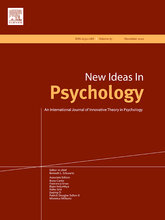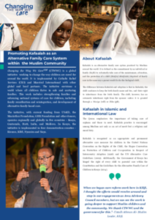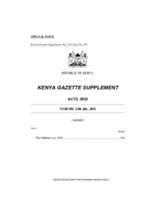Displaying 211 - 220 of 1622
Children are increasingly involved in sand mining in East Africa. The illegal sand trade occurs in mostly remote areas, hidden from sight and out of reach of anti-child labour advocacy campaigns. That makes it hard to determine the exact number of youngsters involved.
There exists a gap in care leaving literature about the extent to which the labelling and stereotyping of care leavers during their time in residential care facilities affects their transitions into adulthood. This paper presents an analysis of interviews conducted with care leavers from six childcare facilities in Zimbabwe (n = 30).
This short document describes the process of ensuring Kafaalah is considered as a family-based alternative care option within Kenya and the work to promote best practice within the model. It describes the journey of developing a framework and standard operating procedures, beginning with the launch of the Kenyan Guidelines on the Alternative Family Care of Children in 2014. Changing the Way We Care worked with many partners and shares the learning on Kafaalah through this document. Changing the Way We Care is a global initiative implemented by Catholic Relief Services, Maestral International, and other global, national and local partners working together to change the way we care for children around the world.
This webinar hosted by the ESARO Regional Learning Platform, provides nine lessons learned on care reform from the COVID-19 pandemic with examples from Malawi, Uganda and Kenya.
This webinar provides nine lessons learnt on care reform from the COVID-19 pandemic with examples from Malawi, Uganda and Kenya.
In 2021 and 2023 Changing the Way We Care (CTWWC) completed a household survey of children and caregivers, in demonstration countries Guatemala, Kenya and Moldova, to understand their experience of CTWWC services, the protective factors in their families, and the status of child well-being. Part of CTWWC’s evaluations, the resulting findings are designed to help CTWWC and other care reform actors to understand the successes and challenges of reintegration from residential care and the provision of family strengthening support.
The objective of this webinar was to present the CPSS approach, and reflect on how this approach, and especially the seven intermediate outcomes of CPSS are relevant to the care reform agenda.
In 2021, UNICEF launched its latest approach to Child Protection Systems Strengthening (CPSS), together with benchmarks for measuring the CPSS work, and high impact CPSS interventions. The objective of this webinar is to present this CPSS approach, and reflect on how this approach, and especially the seven intermediate outcomes of CPSS are relevant to the care reform agenda. Colleagues from Rwanda will share how care reform has been used as a strategic entry point to strengthen national Child Protection Systems and help explore how strengthening Child Protection Systems helps accelerate work on care reform.
This webinar shares the process that Family for Every Child is using to facilitate the development of global inter-agency guidance on Kinship Care, aimed at policy makers and programme managers.
The Children Act, 2022, is an act of Parliament to give effect to Article 53 of the Constitution; to make provision for children rights, parental responsibility, alternative care of children including guardianship, foster care placement and adoption; to make provision for care and protection of children and children in conflict with the law; to make provision for, and regulate the administration of children services; to establish the National Council for Children’s Services and for connected purposes.



